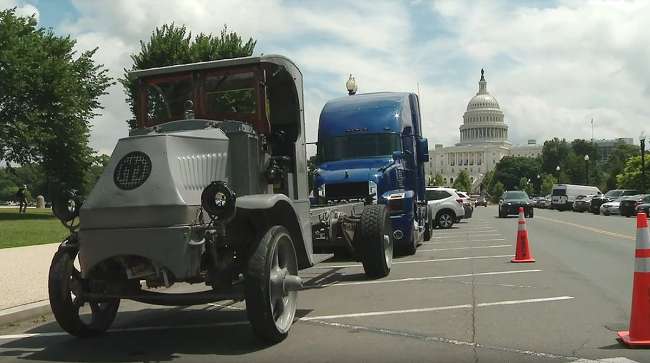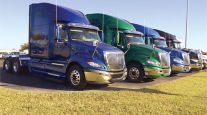Senior Reporter
Coalition Pushes for Federal Excise Tax Repeal on New Trucks

[Stay on top of transportation news: Get TTNews in your inbox.]
A group of stakeholders is pushing for the congressional repeal of the federal excise tax on the sale of heavy-duty trucks and trailers.
At a forum June 19, the Modernize the Truck Fleet coalition urged federal lawmakers to pass the Modern, Clean, and Safe Trucks Act of 2019.
The legislation, introduced in the U.S. House of Representatives in April, would repeal the 12% federal excise tax on certain heavy-duty trucks, tractors and trailers. Senate companion legislation was recently introduced.

Teuton
“The [federal excise tax] was first enacted to help pay for World War I,” said Jodie Teuton, chairwoman of the American Truck Dealers, a coalition member. She is vice president of Kenworth of Louisiana. “This tax may have made sense in 1917, but today the FET delays heavy-duty truck fleet turnover by adding more than $20,000 to the average price of a new truck.”
“With an infrastructure bill as likely to pass as any piece of legislation this Congress, this is the time to put all of our combined energy into finding a way to replace the onerous FET,” added Jake Jacoby, president and CEO of Truck Renting and Leasing Association. “We are excited to be a part of such a collaborative effort working with truck companies, manufacturers, dealers and end users who all want to put the cleanest, most technologically advanced trucks onto our highways immediately.”
The coalition also includes NTEA — The Association for the Work Truck Industry, the Truck and Engine Manufacturers Association, the National Trailer Dealers Association and National Tank Truck Carriers Association. American Truck Dealers is a division of the National Automobile Dealers Association.
On average, the excise tax at the federal level has the potential to add $12,000 to $22,000 to the sale of a new truck, the bill’s sponsors have emphasized.
Heavy-duty trucks on the roadways are about a decade old. Also, most new trucks have multiple advanced safety features, and new technologies have helped to reduce nitrogen oxide emissions, sponsors explained.
“The FET made sense when it was implemented 100 years ago, but just like trucks that were designed in 1917, it’s no longer the best option in the modern world. Today, it’s a cost-prohibitive barrier for small businesses looking to upgrade their outdated trucks to safer, cleaner, more modern vehicles. The average age of most heavy-duty trucks on the road today is nearly 10 years old – that means a decade worth of technological advancements is effectively being sidelined,” said Rep. Doug LaMalfa (R-Calif.), who introduced the bill with Rep. Collin Peterson (D-Minn.) in April. He sits on the influential committee on Transportation and Infrastructure.
Modernize the Truck Fleet Coalition Rallies Support for H.R. 2381/S. 1839 to Repeal the FET: https://t.co/DRJbdrv75v #modernizetrucks — Truck Dealers (@TruckDealers) June 19, 2019
“The (FET) is an outdated burden to small businesses looking to invest in our transportation industry. Repealing this tax would encourage new, and cleaner fuel-efficient vehicles on our roads,” added Peterson, chairman of the Agriculture Committee.
“While we need to find ways to fully fund the Highway Trust Fund and invest in our outdated infrastructure, we need to do so in a way that is not counterproductive. The FET makes it harder to invest in safer and cleaner fleets and does not represent the usage these vehicles are putting on our roads. This language should help drive the discussion toward addressing our transportation infrastructure needs and not singling out certain users for paying for it,” Peterson added.
The House bill was referred to the tax-writing Ways and Means panel. Sen. Cory Gardner, a Colorado Republican, introduced the companion legislation June 14, which was referred to the tax-writing Finance Committee.




